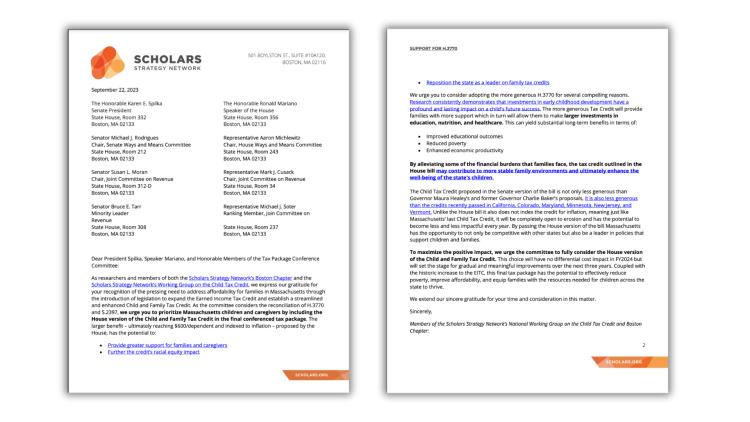A group of scholars from the SSN CTC Working Group & Boston Chapter wrote a letter to the Massachusetts legislature underscoring relevant research related to a tax package in September 2023.
Child Tax Credit Working Group
Policy Pieces

Policy Brief | Tax Policy as a Potential Tool for Reducing Infant Mortality
By Jean Amanda Junior
"A child tax credit in Illinois is likely to have multiple positive impacts, including reducing poverty, promoting racial equity, boosting economic growth, and saving or creating jobs."

Public Comment | Statement on Proposed Child Tax Credit for Washington DC
By Harry Holzer
"I strongly support a proposal to implement a Child Tax Credit (CTC) in Washington DC by $500 per child under the age of 18 and $1000 per child under the age of 6."

Policy Brief | Policy Considerations and Challenges for Successful Passage of New Child Tax Credit in Oregon
By Mary King
"Oregon provides a case study of considerations and challenges, as well as of likely allies and opponents, for passing a new or expanded child tax credit at either the state or national level."

Policy Brief | How the Earned Income Tax Credit Helps Low-Income Americans without Stigma
By Sarah Halpern-Meekin
"Despite remaining challenges, today’s Earned Income Tax Credit shows it is possible to provide financial assistance to low-income Americans without social exclusion or stigma. At both the federal level and in the states, this is a worthy goal for all aspects of U.S. poverty policy."

Policy Brief | Should the Federal Government Permanently Expand the Child Tax Credit?
By Harry Holzer
"A permanent expansion of the Child Tax Credit, along the lines of the 2021 expansion, would no doubt continue to alleviate material hardship and food insecurity among lower-income families with children."

Policy Brief | The Shallow Bipartisanship of the Child Tax Credit
By Christopher Howard
"Advocates looking to help low-income families under divided government might need instead to pursue incremental changes to the CTC or the EITC or look to legislation at the state level."
Media Hits

Podcast Guest | Speaking of Kids...: Child Poverty is a Policy Decision With Megan Curran and Sophie Collyer
From Bruce Lesley and Messellech “Selley” Looby
"In this episode, [Curran & Collyer] explain why the U.S. needs the Child Tax Credit and help unpack the economic contradictions that place a burden on families."

Interview | WPR: U.S. House passes expanded child tax credit bill
By Shereen Siewert
"A sociologist focused on families and social policy helps us understand the stakes of a newly passed bill to expand the child tax credit."

Quoted | The New York Times: Poverty Has Soared in New York, With Children Bearing the Brunt
By Stefanos Chen, NYT
"The national poverty rate in 2022 was 12.4 percent, up from 7.8 percent in 2021, the largest one-year jump on record, according to the United States Census Bureau. New York City’s rate was nearly double the national average, and there are signs that the gap is widening, Dr. Wimer said."

OpEd | The Conversation: Congress is close to expanding the child tax credit again − with a smaller boost for families this time
By Natasha Pilkauskas & Katherine Michelmore
"The child tax credit, first enacted in 1997, was originally designed to help middle-class families with the costs of raising kids by giving them and upper-class families a tax credit of US$400 per child."

OpEd | Hartford Courant: Don’t take the wrong lessons after toddler’s death
By Kelly Fong
"Following the death of 2-year-old Corneliuz Williams, who fell from a window in his third-floor Hartford apartment building last month, many are rightly asking how this tragedy could have been prevented and how Connecticut can protect children like Corneliuz going forward."


Experts Available: Expanded Child Tax Credit Bill
These six scholars offer their expertise on January 2024 developments in Congress in regards to the bipartisan tax package that would include an expanded Child Tax Credit.
Select Academic Publications
On the Child Tax Credit
“The Antipoverty Effects of the Expanded Child Tax Credit across States: Where Were the Historic Reductions Felt?” (Christopher Wimer with Bradley L. Hardy, and Sophie M. Collyer). The Hamilton Project (2023).
"Association Between Material Hardship in Families With Young Children and Federal Relief Program Participation by Race and Ethnicity and Maternal Nativity" (Stephanie Ettinger de Cuba with Félice Lê-Scherban, Allison Bovell-Ammon, Sharon Coleman, Lindsey Rateau, Diana Cutts, Maureen Black, Timothy Heeren, and Deborah A Frank). National Library of Medicine (2023).
“Association of the Expiration of Child Tax Credit Advance Payments With Food Insufficiency in US Households” (Stephanie Ettinger de Cuba with Allison Bovell-Ammon, Nicole C McCann, Martha Mulugeta, Julia Raifman, and Paul Shafer). National Library of Medicine (2023).
“The Benefits and Costs of a U.S. Child Allowance” (Christopher Wimer with Irwin Garfinkel, Laurel Sariscsany, Elizabeth Ananat, Sophie M. Collyer, Robert Paul Hartley, and Buyi Wang). National Bureau of Economic Research (2022).
“Child Tax Credit Redux” (Francine Lipman with James Williamson). The Social Science Research Network (2019).
“Comparing Plans to Reduce Child Poverty: the Family Security Act 2.0 Framework and the Expanded Child Tax Credit” (Elaine Maag with Kevin Werner, and Nikhita Airi). Tax Policy Center- Urban Institute and Brookings Institute (2022).
“Does Unconditional Cash during Pregnancy Affect Infant Health?” (Krista Ruffini). The Social Science Research Network (2023).
“The Effects of Child Poverty Reductions on Child Protective Services Involvement" (Jessica Pac, Lawrence Berger, and Christoper Wimer with Sophie Collyer, Kirk O’Brien, Elizabeth Parker, Peter Pecora, Whitney Rostad, and Jane Waldfogel). The University of Chicago Press Journals (2023).
“Effects of the Expanded Child Tax Credit on Household Spending: Estimates Based on U.S. Consumer Expenditure Survey Data” (Christopher Wimer with Jake Schild, Sophie M. Collyer, Thesia Garner, Neeraj Kaushal, Jiwan Lee, and Jane Waldfogel). National Bureau of Economic Research (2023).
“The Effects of the 2021 Monthly Child Tax Credit on Child and Family Well-Being: Evidence from New York City” (Christopher Wimer with Sophie Collyer, Jill Gandhi, Irwin Garfinkel, Schuyler Ross, and Jane Waldfogel). Sage Journals (2022).
“The Effects of the Monthly and Lump-Sum Child Tax Credit Payments on Food and Housing Hardship” (Megan Curran and Christopher Wimer with Zachary Parolin, Elizabeth Anana, and Sophie Collyer). American Economic Association (2023).
“Employment, Financial and Well-being Effects of the 2021 Expanded Child Tax Credit” (Elaine Maag with Leah Hamilton, Stephen Roll, Mathieu Despard, and Yung Chun). Washington University in St. Luis, Social Policy Institute (2021).
“Families with low incomes and the Child Tax Credit: Who is still missing out?” (Natasha Pilkauskas with Katherine Michelmore). Poverty Solutions Brief (2021).
“‘I didn’t have to worry' – How the Child Tax Credit Helped Families Catch Up on Rent and Improved Health” (Stephanie Ettinger de Cuba with Allison Bovell-Ammon, Shailly Gupta-Barnes, Jalen Banks, Elizabeth Bates, Sharon Coleman, Charlotte Bruce, and Félice Lê-Scherban). Research from partnership with Children’s HealthWatch, Revolutionary Healing, and the Kairos Center for Religions, Rights, and Social Justice (2022).
“The Impacts of the 2021 Expanded Child Tax Credit on Family Employment, Nutrition, And Financial Well-Being” (Elaine Maag with Leah Hamilton, Stephen Roll, Mathieu Despard, Yung Chun, Laura Brugger, Michal Grinstein-Weiss). Global Economy and Development at Brookings (2022).
“The Initial Effects of the Expanded Child Tax Credit on Material Hardship” (Megan Curran and Christopher Wimer with Zachary Parolin, Elizabeth Ananat, and Sophie M. Collyer). National Bureau of Economic Research (2021).
“Issues in Child Benefit Administration in the United States” (Elaine Maag with Sam Hammond). Urban Institute (2021).
“National Survey: Families Faced Financial Strain When Expanded CTC Expired” (Elaine Maag with Ashley Burnside, Bruce Fuller, Kathryn Menefee, Brayan Rosa-Rodríguez, and Qifan Zhang). Center for Law and Social Policy (2023).
“Pandemic Tax Relief Pummels Child Poverty: Time to Make It Permanent” (Francine Lipman). The American Bar Association (2023).
“Perspectives on the Impact of the Expanded Child Tax Credit and the Development of a New Research Agenda on Child and Family Economic Well-Being” (Elaine Maag with Joseph Broadus, Hilary Hoynes, and Danny Rose). Tax Policy Center- Urban Institute and Brookings Institute (2022).
“Receipt and usage of the Child Tax Credit payments among low-income families” (Natasha Pilkauskas with Patrick Cooney). Poverty Solutions Brief (2021).
“Reducing Poverty among Children: Evidence from State Policy Simulations” (Jessica Pac with Irwin Garfinkel, Neeraj Kaushal, and Jaehyun Nam). Children and Youth Services Review (2020).
“Research Roundup of the Expanded Child Tax Credit: One Year On.” (Megan Curran). Poverty and Social Policy Report, vol. 6, no. 9. Center on Poverty and Social Policy, Columbia University (2022).
“Unconditional cash transfers and mental health symptoms among parents with low incomes: Evidence from the 2021 Child Tax Credit” (Natasha V. Pilkauskas with Nicole Kovsk, Katherine Michelmore, and Luke Shaefer). Social Science and Medicine - Population Health (2023).
“Understanding Yearly Changes in Family Structure and Income and Their Impact on Tax Credits” (Elaine Maag with Nikhita Airi, and Lillian Hunter). Tax Policy Center- Urban Institute and Brookings Institute (2023).
“Who Has Received Advance Child Tax Credit Payments, and How Were the Payments Used?” (Elaine Maag with Michael Karpman, Genevieve M. Kenney, and Douglas A. Wissoker). Urban Institute (2021).
“Young child poverty in the United States: Analyzing trends in poverty and the role of anti-poverty programs using the Supplemental Poverty Measure” (Jessica Pac and Christopher Wimer with Jaehyum Nam, and Jane Waldfogel). Children and Youth Services Review (2017).
“The 2021 Child Tax Credit, living arrangements, and housing affordability of families with low incomes” (Natasha V. Pilkauskas with Katherine Michelmore & Nicole Kovski). National Bureau of Economic Research (2023).
“The 2021 Child Tax Credit: Who received it and how did they spend it?” (Natasha V. Pilkauskas with Katherine Michelmore). American Economic Association (2023).
On the Earned Income Tax Credit
“A Hand Up for Low-Income Families” (Sarah Halpern-Meekin with Laura Tach, Jennifer Sykes, and Kathryn Edin). Sage Journals (2016).
“‘As Good as Money in the Bank’: Building a Personal Safety Net with the Earned Income Tax Credit” (Sarah Halpern-Meekin with Laura Tach, Kathryn Edin, and Mariana Amorim). Society for the Study of Social Problems (2019).
"Dignity and Dreams: What the Earned Income Tax Credit (EITC) Means to Low-Income Families" (Sarah Halpern-Meekin with Jennifer Sykes, Katrin Kriz, and Kathryn Edin). American Sociological Review (2015).
“The Earned Income Tax Credit, Family Complexity, and Children’s Living Arrangements” (Natasha V. Pilkauskas with Katherine Michelmore). RSF: The Russell Sage Foundation Journal of the Social Sciences (2022).
“The Earned Income Tax Credit, Poverty, And Health” (David Simon with Mark McInerney and Sarah Goodell). Health Affairs (2018).
“The effect of the Earned Income Tax Credit on housing and living arrangements” (Natasha V. Pilkauskas with Katherine Michelmore). Demography (2019).
"Income, the Earned Income Tax Credit, and Infant Health" (David Simon with Hilary Hoynes and Doug Miller). American Economic Journal; Economic Policy (2015).
“The Intergenerational Transmission of Poverty and Public Assistance: Evidence from the Earned Income Tax Credit” (Natasha V. Pilkauskas with Nicardo S. McInnis, and Katherine Michelmore). National Bureau of Economic Research (2023).
“Intimate Partner Violence and Income: Quasi-Experimental Evidence from the Earned Income Tax Credit” (David Simon with Resul Cesur, Núria Rodriguez-Planas, Jennifer Roff). The National Bureau of Economic Research (2022).
“The Rainy Day Earned Income Tax Credit: A Reform to Boost Financial Security by Helping Low-Wage Workers Build Emergency Savings” (Sarah Halpern-Meekin with Sara Sternberg Greene, Ezra Levin, and Kathryn Edin). The Russell Sage Foundation Journal of the Social Sciences (2018).
“A Universal EITC: Making Work Pay in the Age of Automation” (Leonard Burman). National Tax Journal (2021).
“A Universal EITC: Sharing the Gains from Economic Growth, Encouraging Work, and Supporting Families” (Leonard Burman). Tax Policy Center- Urban Institute and Brookings Institute (2019).
“Tots and teens: How does child’s age influence maternal labor supply and child care response to the Earned Income Tax Credit?” (Natasha V. Pilkauskas with Katherine Michelmore). Journal of Labor Economics (2021).
“Who’s minding the kids? The Earned Income Tax Credit and child care arrangements” (Natasha V. Pilkauskas with Katherine Michelmore). ANNALS of the American Academy of Political and Social Science “Restructuring a Social Safety Net: Overlapping Public Investments and Child Wellbeing” (forthcoming).